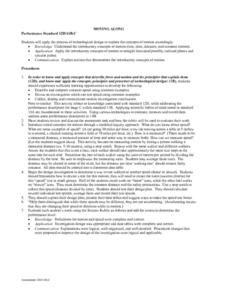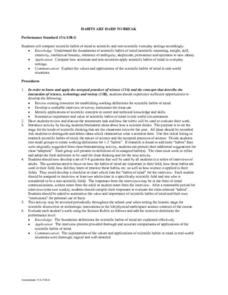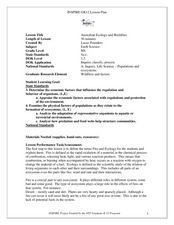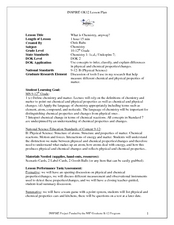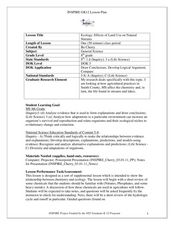Curated OER
Making New Electricity
Students investigate the concepts of energy conversion and conservation. They research the history of energy conversions into electrical energy. They design experiments in order to replicate a conversion of energy into electricity.
Curated OER
Rain Drops
Students examine drops of water on several materials used on the outside of buildings. They make selective observations on and compare plastic, wood, brick, metal, roof tiles and glass.
Curated OER
Moving Along
Students are introduced to the concept of motion. In groups, they practice calculating the rate, time, and distance of various objects on a variety of surfaces. To end the lesson, they apply the same principles to those objects moving...
Curated OER
Pendulum Patterns
High schoolers identify the variables involved in the motion of a pendulum. In groups, they research how each different variable is related to the energy the pendulum produces. They share their results with the class and compare them...
Curated OER
Weather Where We Are
Students investigate the reports of local weather. They identify types of weather data and correlate it to the conditions. Using the data students draw a picture of the current weather. They conduct the same investigation for all four...
Curated OER
Water, Water Everywhere
Studetns view a terrarium with water droplets on the wals. They discuss the ways the water could have got onto the wall of the terrarium. Students design an experiment to duplicate the process. They describe the patterns form their data...
Curated OER
Stellar Spectral Fingerprints
Students listen as the teacher introduces Newton's early discovery of the diffraction of light. They use multiple sources of light (fluorescent, incandescent, sunlight, etc) to bend the light. They first use a prism then a diffraction...
Curated OER
Choices Affect the Environment-I Make a Difference
Students examine and research how personal and societal choices can affect the environment. Student find resources that provide scientific research about the possible impact of each of the choices. Students then create a four-panel...
Curated OER
Mississippi’s Contribution to Space Exploration
Eighth graders engage in a class discussion while going through a PowerPoint on Mississippi's contribution to space exploration. In this Space science lesson plan, the students will also participate in Brain Pop quizzes where they will...
Curated OER
Habits Are Hard to Break
Studens brainstorm ideas about the ways scientists think. In small groups, studentds create a definition for one or two "habits." Students develop a set of questions to be used by the entire class in a series of interviews. Students...
Curated OER
BEWARE OF POISONS
Students research and explore all the safety conditions to being exposed to poisons in real-world situations. They review/discuss/investigate about types, sources, effects and responses of poisons by creating general questions to pose to...
Curated OER
Australian Ecology and Bushfires
Eighth graders discuss the different types of ecosystem. In this earth science lesson, 8th graders explain the benefits and harm of fire. They research articles about bush fires or controlled burn instance and share it with the class.
Curated OER
Photosynthesis and Respiration
Eighth graders differentiate photosynthesis and respiration. In this biology instructional activity, 8th graders draw a diagram explaining these two processes. They answer a quiz after the instructional activity.
Curated OER
Physical and Chemical Changes
Eighth graders distinguish between physical and chemical change. For this chemistry lesson, 8th graders observe a series of demonstrations showing physical and chemical changes. They identify the signs that a chemical reaction took place.
Curated OER
Ecology: Adaptations
Eighth graders identify different types of adaptation in organisms. In this biology lesson, 8th graders explain how adaptation help organisms survive. They complete a worksheet at the end of the lesson.
Curated OER
Pendulum Lab
Students predict how changing the pendulum components affect its period. In this physics lesson, students calculate the period using different masses. They analyze lab result and complete assigned worksheet.
Curated OER
Vectors
Students differentiate distance and displacement. In this physics lesson, students use formulas to calculate for displacement. They draw vectors using the grid.
Curated OER
Converting Metric Units and Prefixes
Students investigate the length of various objects. In this measurement lesson, students convert one metric unit to another. They explain the importance of a uniform system of measurement.
Curated OER
Newton’s Laws of Motion
Eighth graders explore the three laws of motion. For this physics lesson, 8th graders observe teacher demonstration and explain what happened in terms of Newton's Laws. They complete worksheet at the end of the lesson.
Curated OER
What Is Chemistry, Anyway?
Students differentiate physical and chemical change. For this chemistry lesson, students list examples of those changes. They apply what they learned in a Jeopardy style team game.
Curated OER
Ecology: Effects of Land Use on Natural Streams
Eighth graders examine how humans affect various ecosystems. In this ecology instructional activity, 8th graders discuss different ways that contaminants enter the stream. They explain the consequences of eutrophication in lakes.
Curated OER
Who Wants to be a Cellular Biologist?
Eighth graders review concepts in cellular biology. In this biology lesson, 8th graders play an interactive game based on the idea of winning money. They discuss misconceptions about the topic.
Curated OER
The ABC's of Walter Anderson
Fifth graders examine how motifs, symbols, and ideas influence various pieces of visual art. They compare and contrast the work of Walter Anderson to pre-historic cave paintings and create a glue line print using motifs and symbols found...
Curated OER
Raptor Poetry
Young scholars create poems about raptors. They discuss raptors and create three poems including at least two of the following: haiku, diamante, found, and acrostic. They create a classroom book of poems or conduct a poetry slam where...




